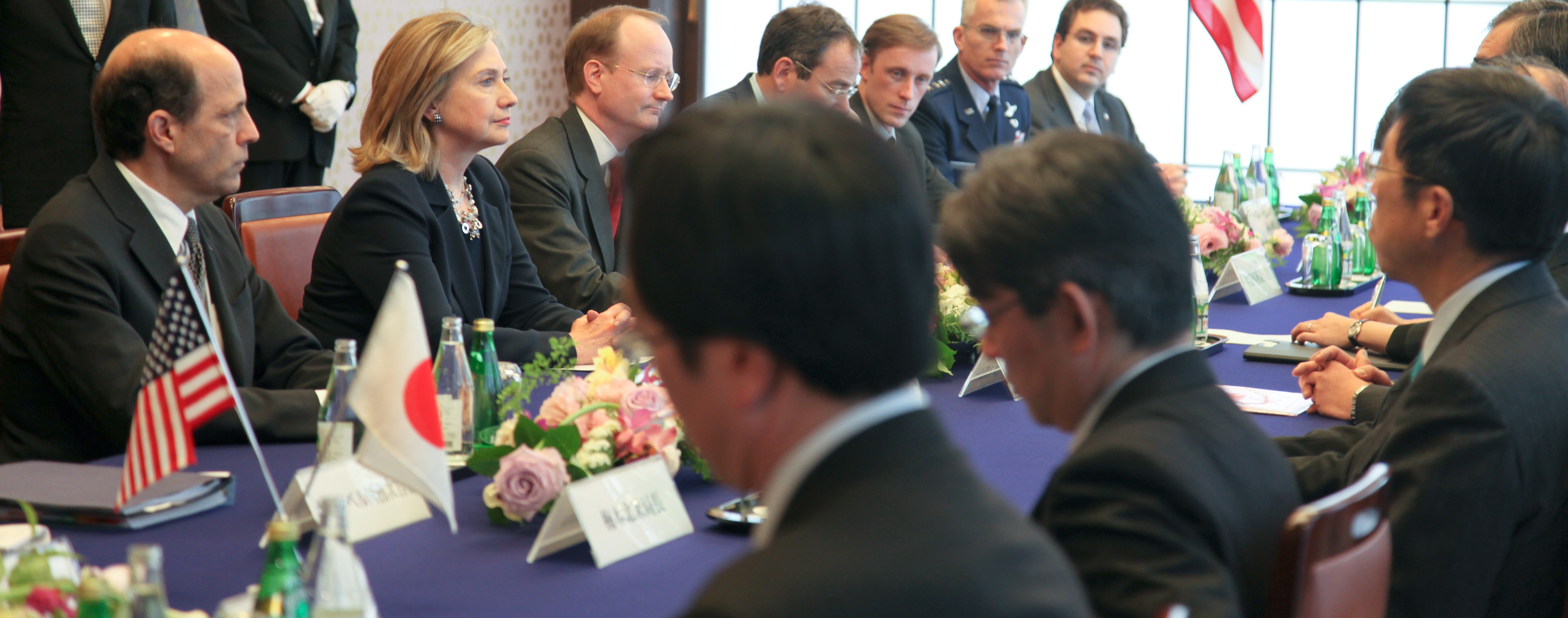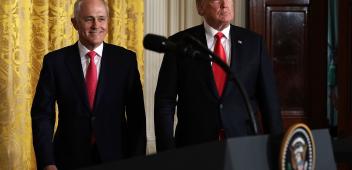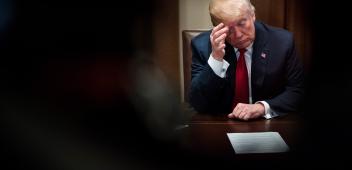US election puts TPP in doubt
Originally published in the Nikkei Asian Review. Hillary Clinton has been forced into explicit disavowal of the TPP. She was a supporter of the TPP's "gold standard" when she was President Barack Obama's secretary of state.

Executive Summary
The Trans-Pacific Partnership, agreed earlier this year by 12 participating countries, was promoted as the "platinum-standard" international trade agreement. Still requiring ratification, the pact now seems unlikely to go ahead in the foreseeable future, a victim of the U.S. electoral process. Both presidential candidates have explicitly rejected it. How much will be lost if this much-hyped trade deal falls by the wayside?
In the fetid atmosphere of the election hustings, the U.S. is experiencing the same public disenchantment with globalization that fostered Britain's recent vote to leave the European Union. Eight years of feeble recovery after the 2008 financial crisis have combined with structural trends in income inequality, social disadvantage and shrinking manufacturing employment to produce widespread discontent. The blame has been laid on the economy in general and globalization in particular. Globalization is blamed not just for the displacement of domestic production by cheap imports, but for a range of social changes which really owe more to technological progress.
Donald Trump, whose Republican party is the traditional supporter of free trade, proposes to end the North America Free Trade Agreement and impose 35%-45% tariffs on Mexican and Chinese imports. It is unsurprising, then, that he describes the TPP as "the rape of America."
The TPP is finished if he becomes president.
Hillary Clinton, for her part, might have begun with a more nuanced position, but has been forced into explicit disavowal of the TPP. It was her husband that put in place NAFTA in 1994, and she was a supporter of the TPP's "gold standard" when she was President Barack Obama's secretary of state.
But her rival Bernie Sanders, who has since pulled out of the Democratic race, tapped into the popular discontent when he said: "The Trans-Pacific Partnership is a disastrous trade agreement designed to protect the interests of the largest multi-national corporations at the expense of workers, consumers, the environment and the foundations of American democracy. It will also negatively impact some of the poorest people in the world. The TPP is a treaty that has been written behind closed doors by the corporate world. Incredibly, while Wall Street, the pharmaceutical industry and major media companies have full knowledge as to what is in this treaty, the American people and members of Congress do not. They have been locked out of the process."
With both left and right of politics agreeing on this issue, Clinton has been forced into an explicit renunciation of the TPP, which would be hard to reverse.
To add further complication, some key members of Congress want to renegotiate sensitive parts of the agreement already concluded, particularly on intellectual property protection for pharmaceutical biologics. Orrin Hatch, chairman of the key Senate Finance Committee, seems intransigent on this issue. Others are still dissatisfied with the protection against "currency manipulation," reviving an old irritant triggered by China's success in becoming manufacturer to the world after its entry into the World Trade Organization in 2001.
The other partners, however, will not welcome such a re-opening of the draft, to shift it even further in favor of American interests. Japan's TPP minister Nobuteru Ishihara has already voiced his unhappiness with the idea of renegotiation. With these issues unresolved, the chances of Obama sneaking the TPP through in the "lame duck" session between the November election and the inauguration of the new president are slim, despite the administration's current efforts to keep this option alive.
Those who think that Clinton would change her mind when the election is over are misreading the deep-seated discontent that has attached itself onto the idea of globalization. This is not something that can be fixed with a few tweaks to the tax system and additional assistance for employment restructuring.
Arlie Hochschild's "Strangers in their own Land: Anger and Mourning on the American Right" captures the intractability of the discontent: "You are patiently standing in a long line for something you call the American dream. You are white, Christian, of modest means, and getting along in years. You are male. There are people of color behind you, and in principle you wish them well. But you've waited long, worked hard, and the line is barely moving. Then 'Look! You see people cutting in line ahead of you!' Who are these interlopers? Some are 'black,' others 'immigrants, refugees.' They get affirmative action, sympathy and welfare - 'checks for the listless and idle.' The government wants you to feel sorry for them."
At an intellectual level, Clinton no doubt accepts the benefits of globalization. But if she is elected, will she give high priority to explaining why she is now changing her mind and supporting legislation which seems to have no friends at all?
TPP a panacea?
To assess how much the lapse of the TPP would matter, the two-fold nature of the pact must be considered. It is not just about economics: It is about geopolitics as well.
It takes the form of an economic agreement that creates a set of "behind-the-border" rules covering issues ranging from intellectual property, to international dispute settlement and the role of state-owned enterprises. No one doubts the desirability of achieving international uniformity to govern the huge variety of issues which arise through globalization. But plurilateral preferential trade agreements like this may not be the best way to do this.
To start with, preferential trade agreements inevitably distort trade, favoring imports from partners rather than the cheapest source. Sanders articulated another problem with the TPP: It has not been formulated in the overall public interest, but instead reflects strong pressure from vested interests, mainly American. The intellectual property provisions have been drafted with the interests of IP owners rather than users in mind: The longer the protection, the less benefit to users.
The dispute settlement provisions favor countries which are largely foreign investors, at the expense of countries which are hosts to the investors. Labor standards protect countries with high-labor costs, forcing more expensive requisites on low-income countries, thus reducing their comparative advantage. Constraints on state-owned enterprises disadvantage countries where such businesses are the norm.
Thus from an economic viewpoint, perhaps it is no great loss if the TPP goes into limbo. Perhaps its demise might even open up later opportunities for a better solution -- the day may come when the system of international governance can write a far better set of multilateral rules for the WTO, for international corporate taxation, for intellectual property, for global capital movements and the myriad of other global economic issues, rather than having these formulated within the vested-interest processes in a single dominant country.
The TPP, however, has implications beyond its economic form: There is a parallel shadow geopolitical issue embedded in these economic clauses. Of course the TPP is not intended to contain China. U.S. administration officials have been adamant on this. They even suggest that, one day, China could join if it meets the rules. But President Obama has been more explicit, in his Congressional advocacy, that America should get in ahead of China's influence on rule-setting. There is a hint here that the TPP, with its Asian-heavy membership (and more in prospect), could be a useful club of like-minded countries, united by common geopolitical concerns about the rise of China.
This powerful sub-agenda has encouraged Singapore, New Zealand and Australia to publicly urge President Obama to press ahead with ratification of the TPP. Australia's Malcolm Turnbull expressed the widely held view: "It is a statement of America's commitment to the region." What is there left of the pivot to Asia if this key element falls over? Singapore's Prime Minister Lee Hsien Loong expressed the feeling of being let down when "at the end, waiting at the altar, the bride doesn't arrive."
But is this uncomfortable welding together of economics and geopolitics the most sensible way to go? The world needs better rules for its international economic interaction but China, now the largest trading nation, should surely be part of these rules, in the same way that it is a member of WTO, the International Monetary Fund and the Bank for International Settlements. To try to gain geopolitical advantage by building exclusive trading groups precludes an alternative, perhaps more fruitful strategy, in which China is both welcomed and enmeshed in the fabric of international trade.
If losing the TPP is the price that has to be paid for ensuring a Clinton win among an electorate disenchanted with globalization, then this is worth paying. The Peterson Institutein Washington leaves no doubt on its judgment between the two candidates: "While Clinton's stated trade policy would be harmful, Trump's stated trade policy would be horribly destructive." Over the longer term, the constituency for globalization has to be rebuilt; the methodology for multilateral trade agreements has to be revived; and the geopolitics of China's rise has to be disentangled from the economics.
Stephen Grenville is a nonresident fellow at the Lowy Institute for International Policy in Sydney and a former deputy governor of the Reserve Bank of Australia.
Photo by Flickr user StateHubs.



